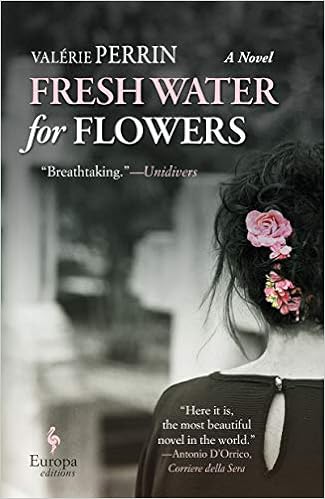4.5 Stars
I’m not sure where I first heard of this title, but I’m so glad I did. It’s magical.When we encounter the protagonist, Violette Trenet, she is 49 years old and the caretaker of a cemetery in Bourgogne in east-central France. Abandoned at birth and shunted between foster home placements, she married young. Her partner, the handsome Philippe Toussaint, soon showed that his “birdsong didn’t live up to the plumage” because he was lazy and manipulative and a philanderer. Though Violette’s life brightened with the birth of a daughter Léonine, the marriage was not a happy one. Philippe left the work to his wife and daily went for motorbike rides; twenty years earlier, shortly after they took over the cemetery job in 1997, he left and didn’t return. Violette doesn’t mourn his absence.
One day, a police detective Julien Seul arrives at the cemetery with a mystery. His mother Irène, who recently passed away, requested to have her ashes buried with Gabriel Prudent, a man unknown to Julien but buried in Violette’s cemetery. This encounter between Julien and Violette leads to uncovering the story of Irène and Gabriel but also leads to Violette examining her life with Philippe and discovering what happened to him.
Violette is a very interesting main character. She has many strengths: she teaches herself to read, shoulders the work of two adults, raises her daughter as a virtual single parent, and makes a good life for herself after tragedy. Her kindness leads to the creation of wonderful friendships. She serves as a confidante and provides comfort to the bereaved: “I get tears, confidences, anger, sighs, despair.” She treats the deceased with respect: “Maintaining it is all about caring for the dead who lie within it. It’s about respecting them. And if they weren’t respected in life, at least they are in death. I’m sure plenty of bastards lie here. But death doesn’t differentiate between the good and the wicked. And anyhow, who hasn’t been a bastard at least once in their life?” She does her job with love and pride, even recording everyone’s funeral and tending graves, tasks she isn’t required to do: “’if we had to do only what was part of our job, life would be sad.’” She is someone whom many, including the reader, come to admire.
The book has something for everyone. There’s more than one mystery with several twists. There’s a heartbreaking tragedy. There’s romance. And despite the death and sadness, there is humour. A scene describing how Violette scares away some misbehaving young people from the cemetery is hilarious. And the overall message is life-affirming; at one point Violette falls into a deep depression but eventually she returns to tending her garden and gives “fresh water to the flowers.” She decides, “My present life is a present from heaven. As I say to myself every morning, when I open my eyes. I have been unhappy, destroyed even. Nonexistent. Drained. I was like my closest neighbors, but worse. . . . But since I’ve never had a taste for unhappiness, I decided it wouldn’t last. Unhappiness has to stop someday.”
Each chapter begins with an epitaph which could appear on a tombstone: “The darkness has to intensify for the first star to appear” and “You’re no longer where you were, but you’re everywhere that I am” and “May your rest be as sweet as your heart was kind” and “Sleep, Nana, sleep, but may you still hear our childish laughter up there in highest Heaven” and “The leaves fall, the seasons pass, only memory is eternal.”
I loved the writing style. I was hooked from the very beginning: “My closest neighbors don’t quake in their boots. They have no worries, don’t fall in love, don’t bite their nails, don’t believe in chance, make no promises, or noise, don’t have social security, don’t cry, don’t search for their keys, their glasses, the remote control, their children, happiness. . . . They’re not ass-kissers, ambitious, grudge-bearers, dandies, petty, generous, jealous, scruffy, clean, awesome, funny, addicted, stingy, cheerful, crafty, violent, lovers, whiners, hypocrites, gentle, tough, feeble, nasty, liars, thieves, gamblers, strivers, idlers, believers, perverts, optimists. They’re dead.” And some of the similes are wonderful! For example, when she and Philippe are barely speaking, Violette comments, “our dialogues were as flat as Tutankhamun’s brain scan.” And her unpleasant and unhappy in-laws she describes as “Two gherkins in a jar of vinegar.”
This book, a meditation on life, love, and loss, is wonderful. At turns heart-breaking and heart-warming, it will not leave the reader unaffected.

No comments:
Post a Comment